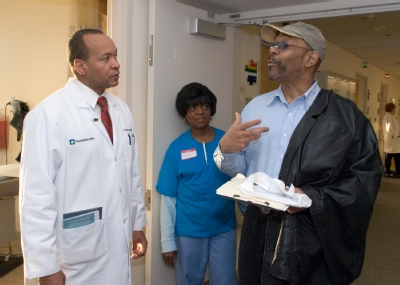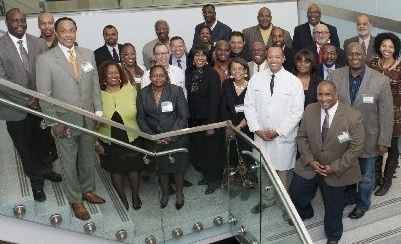
Charles Modlin, MD’87, MBA, remembers spending time in the anatomy classroom as a freshman medical student and playing trumpet in the annual student comedy show In Vivo, but it was his third-year clinical rotations in medical school that had the longest-lasting impact on his professional life, igniting his passion to help eliminate health disparities.
“While at Feinberg, I began to develop an appreciation and understanding of health disparities,” he said. “I noticed that there are differences in how early and how often minority groups are diagnosed with, treated for, and die from a disease as compared to the rest of the population.”
Growing up in a small town in Indiana, Modlin had an eye opening experience when he first arrived at Northwestern University as an undergraduate.
“After arriving in Evanston, I was immersed in population of students from all over the country and world. It was the first time I was exposed to such a diverse group of people. I wasn’t exposed to that diversity in my hometown,” Modlin said.
It was during his four years as a chemistry major that he realized, “how similar people are. We all have the same needs, wants, and aspirations. I learned different things from different people.”
Modlin earned his undergraduate degree in 1983. He was inducted into the Alpha Omega Alpha National Medical Honor Society and completed medical school in 1987. As an alumnus he was elected and served two terms on the FSM alumni board and was instrumental in establishing the FSM Class of 1987 endowed scholarship campaign to provide tuition assistance to deserving medical students.
After his six years of residency in Urological Surgery at New York University, he completed a three-year fellowship in kidney transplantation at the Cleveland Clinic. He then joined the Cleveland Clinic staff in 1996. Modlin, a urologist and one of only approximately 20 African American transplant surgeons in the U.S., committed his career to finding solutions to eliminate healthcare disparities.
“My father taught me the importance of and even placed expectations upon me to utilize my medical education to give back to the community,” Modlin said. “I’m proud and honored to have had the opportunity to become a physician and to be in a position to help people. I do feel that it is my responsibility as an African American physician who is aware of the fact that health disparities are devastating to the black community to assume a leadership role in the elimination of health disparities. As an African American physician many people in the African American community have looked to me, relied upon me and have even placed expectations upon me to assume a leadership role in the medical community to help eliminate health disparities.”
Modlin founded the Cleveland Clinic Minority Men’s Health Center (MMHC) in 2003. The physician credits his education at Northwestern for giving him the skills needed to build the center. He has on several occasions returned as a visiting professor to the Feinberg School of Medicine and to Northwestern’s undergraduate campus to educate students about health disparities.

“Developing an innovative and effective minority health center requires several competencies. First you have to believe that you personally and as an institution can make a difference to improve the health of minority populations. You have to have the ability to clearly communicate to your colleagues and leadership of your medical institution the impact that health disparities have on minority populations. You must clearly communicate also to them your vision as to how your institution can work as a team to address the disparities. Most importantly, you also must possess the ability to directly engage with credibility, build trusting relationships, and communicate reliably with the very minority populations which you are trying to assist” he said. “Northwestern gave me the opportunity to develop those skills by teaching and emphasizing to our medical school class humanitarianism in medicine. I remember that several of our courses challenged us to think about medical ethics and discuss real-case scenarios.”
MMHC’s mission is to address the specific healthcare needs of minority men. The center provides patient care, education and outreach, conducts research into the elimination of healthcare disparities, and offers mentorship to students. The annual MMHC Health Fair provides free health screenings for thousands of minority and non-minority men.
“We have had a lot of success with the health center. We are always working to develop on engaging all of the multicultural populations. In its first year, fewer than 40 men attended the fair and this year we had more than 2000 men attend with 350 volunteers,” he said.
Modlin plans on expanding health literacy and preventive healthcare programs at the center and throughout Cleveland Clinic, and strengthening dedicated efforts in health disparities research and patient care.
He also has established an initiative at Cleveland Clinic and other organizations to promote increased organ donation rates, prevention of kidney disease, and increased awareness of options for kidney transplantation in African American populations.
“African Americans are disproportionately afflicted with kidney disease, and on average must endure longer wait times to receive kidney transplants,” said Modlin.
In 2009, Modlin received the Northwestern University Medical School Inaugural Daniel Hale Williams Award for Meritorious Service to Underserved Communities
“It gave me the opportunity to learn more about Dr. Daniel Hale Williams and the pioneer he was. To have my name alongside his is such a great honor,” said Modlin.
Bringing his father to the ceremony was especially rewarding because “ to me the award represents living proof that people value my work and the award validates the life lessons that were given to me by my parents – giving back to the community. I cherished the fact that my father was there to witness the moment. He was very proud.”
Modlin’s work as a kidney transplant surgeon and urologist and his dedication and advocacy to eliminate health disparities have also led him to being selected by the Atlanta Post as one of the Top 21 Black Doctors in America in 2011 and recognition with a Distinguished Alumni Award by the National Medical Fellowship in April 2012. He also received the Northwestern University Presidential Alumni Medal in 2003.
His goal for the future is to continue his work to improve health outcomes for minorities and expand the reach of his program.
“One of the challenges facing America today is the growing population that is at risk for health disparities. My vision is to have other centers take on and develop the work we have been able to do for our community and do it for people around the country and even the world,” he said.
Modlin adds that he would very much enjoy an opportunity to collaborate and work with alumni of his medical school class of 1987 and other NU alumni to eliminate health disparities.






